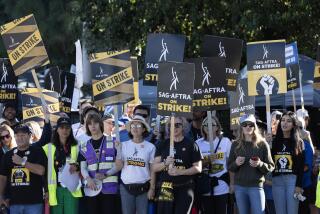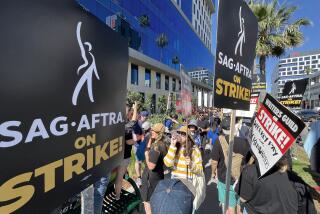CBS and Time Warner Cable extend deal to Friday afternoon
After a tense day of negotiations and a brief blackout, Time Warner Cable and CBS are giving themselves a little more time to come to terms on a new distribution deal.
The two companies said early Tuesday morning that they have extended their current contract to Friday at 2 p.m. Pacific time.
CBS and Time Warner Cable are struggling to reach a new accord on what the cable distributor will pay to carry channels owned by CBS, including KCBS-TV Channel 2 and KCAL-TV Channel 9 Los Angeles, WCBS-TV New York and the premium network Showtime.
PHOTOS: Hollywood backlot moments
On Monday night, Time Warner Cable briefly pulled CBS’ signals off its cable systems and indicated it was throwing in the towel on the talks.
But just minutes later the cable company said it was restoring CBS’ signals to keep talking. Time Warner Cable said it put the channels back on at the request of CBS. That was disputed by the other side.
Either way, the signals were back and viewer disruption was kept to a minimum.
When CBS Chief Executive Leslie Moonves, who was at a party the network was throwing at the Beverly Hilton, heard the company’s signals had come down, he said, “We’re at war with Time Warner Cable.” Later in the evening, after the signals had been restored, he said “progress is being made.”
Neither company will discuss the specific differences in their negotiations. Media analysts and industry insiders, however, say CBS is seeking a large increase in the fee it charges Time Warner Cable to carry its local TV stations. Moonves has not been shy about saying that he feels CBS is undervalued compared to other channels such as USA Network.
PHOTOS: Highest paid media executives of 2012
Media analyst David Banks of RBC Capital Markets said in a recent report that CBS is looking to increase the fee Time Warner Cable currently pays from under $1 per-subscriber, per-month to a figure approaching $2 in the first year and with subsequent increases in later years.
“Time Warner Cable seems incapable of accepting the concept that the value of a company’s programming should be in line with its popularity,” CBS said in a statement after Time Warner Cable had taken its signals down.
Fights between programmers and distributors over money are fairly common but seldom does it get to a point where signals get taken off the air, especially in big markets such as Los Angeles and New York.
As programmers get more aggressive seeking higher fees and distributors try to stand their ground, blackouts are likely to become more common. The Federal Communications Commission has typically chosen not to weigh in on these disputes. There have been calls from Congress to overhaul the so-called retransmission consent rules that allow broadcasters such as CBS the right to negotiate for carriage fees.
If pay-TV customers lose a local CBS station, they can still receive the signal over the air for free with an antenna. Some CBS content is also available online.
ALSO:
After brief blackout, Time Warner Cable and CBS resume talks
CBS boss Leslie Moonves warns potential Time Warner Cable blackout
CBS and Time Warner Cable take their distribution feud public with ad campaigns
Follow Joe Flint on Twitter @JBFlint.
More to Read
From the Oscars to the Emmys.
Get the Envelope newsletter for exclusive awards season coverage, behind-the-scenes stories from the Envelope podcast and columnist Glenn Whipp’s must-read analysis.
You may occasionally receive promotional content from the Los Angeles Times.






